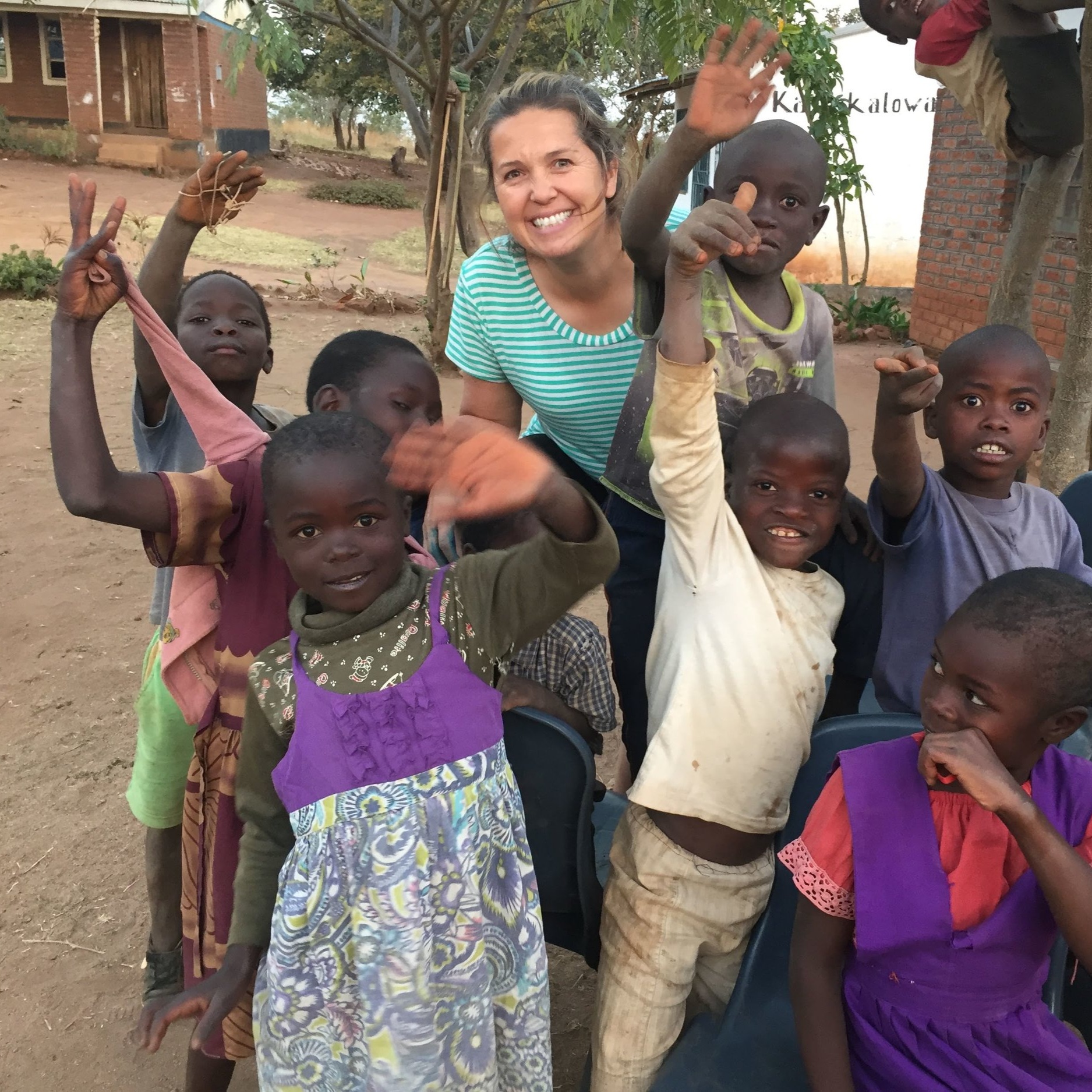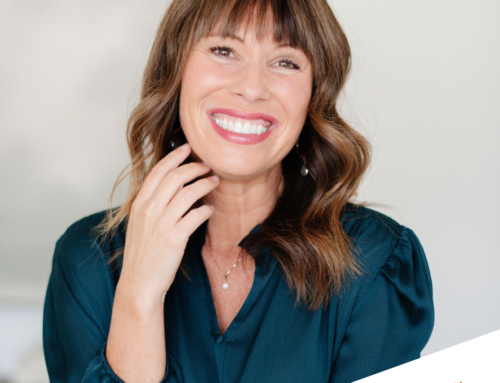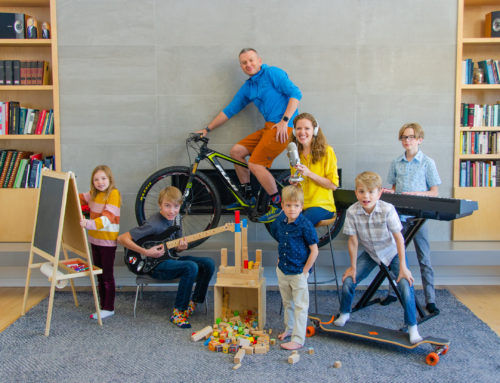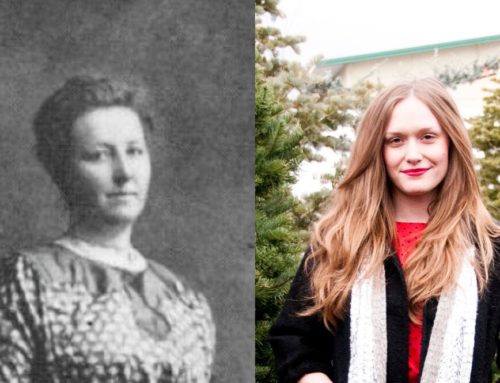I have loved to read since I was a little girl—thanks to both my parents and my Auntie Ann (who was a second mom to me). She was a first-grade teacher and never married or had children of her own. She always brought my seven siblings and me books when she came to visit and she often took us to the library and to bookstores. She just loved to see us learn. She taught us how to imagine and have big ideas and to explore faraway places through books.
I remember how much she celebrated when I learned how to read. She said, “Angie, you can read! Let’s read this book and this book!” She took a picture of me reading. It was a big deal to her, so it became a big deal to me. She was my biggest reading cheerleader.
My parents also encouraged all of their eight children to read. I am the oldest, and my mom had the next six kids in 11 years. We knew my parents loved to read, and we saw them reading frequently. Books were just part of our life.
Creating a Reading Culture
Eventually, I had five children of my own. My three girls came first, and now they’re all off on their own. My two boys are in middle school and high school now. It came naturally to me to create a reading culture in my own home, because my parents were so good at it. I adopted many reading traditions from them, and we’ve also started some of our own. Here are five of the things that have worked for us.
1. Rest Time
Growing up, even in the summers, we had rest time for at least two hours every day. You could take a nap or read a book or write a story. It was quiet alone time—and not just for the kids. My mom would read along with us, every single day. During quiet time, I’d see her on her bed, reading her own book. When my kids were young, I continued my mom’s tradition of quiet time, lying down to read while my kids read their own books. If I was up getting things done, they wanted to be up too. But if we were all reading, it worked.
Now that my kids are older, we still have quiet reading time on Sundays. I try to have them read something more contemplative on Sundays, anything that teaches them compassion or just how to be a better person.
2. Reading Aloud Together
I started reading to my babies before they were born and then continued reading to them in my arms or on my lap. They loved it, and I loved it. It’s just part of our family. It’s what we do. My husband reads to the kids as well, so they know both parents value reading.
I also had my kids read to each other. The big ones read to the little ones and vice versa, which was great for developing their reading skills.
3. Accessible Books
I also make sure that books are accessible. Every child has a bookcase in their room. I try to update it once in a while to make sure they have age-appropriate options, so they can browse through and pick up a good book. And they do.
4. Book Discussions
I love reading the same books as my kids and discussing them. Sometimes this means reading along with assigned books from school, or just reading a book that one of my kids loves so we can talk about it. Our local library hosts a program called Battle of the Books where elementary schools compete in a bowl-style trivia competition about a set of assigned books. I’ve been a coach of our school’s team for five years, mostly because I love that my sons and I can read the same big stack of books and then discuss them.
5. Summer Reading Programs
My kids all know that at the beginning of each summer we rush to the library and sign up for the summer reading program. It’s fun to have little incentives built in. It also sets summer up as a great time to catch up on all the reading we don’t have time for during the busy school year.
6. Reading Yourself
I remember as a young mother I was feeling overwhelmed, and I realized I hadn’t been taking care of my intellectual health. It’s so easy to get busy and stop taking care of ourselves. I joined a book club, and I came home from that first meeting and thought, “My brain is finally engaged again!” Reading books made me more balanced. When we have little ones and our whole lives are consumed with taking care of them, we need to read for us as well.
The benefits of creating this reading culture in our family have been huge. First, I’m convinced that it makes them better students and better learners. If they love to read, they learn how to learn. They’re better students, they’re more inquisitive, they ask better questions, and their minds are open to learning new things, which has lasting value in all parts of their lives.
Reading also builds character. Learning how to understand other people in different situations and places than ourselves surely helps them be more empathetic, more compassionate, more understanding, and better world citizens. They learn that the way they live isn’t the way everybody lives, and they perhaps can be more loving and kind. That has definitely translated to my older girls having experiences with different people all over the world and understanding that we’re not all the same. You don’t actually have to travel there or live somebody else’s life to be compassionate and understand what they’re going through.
Village Book Builders
My second daughter, Brittany, got married last summer to her husband, Mac, who is from Nigeria. He introduced us to an amazing non-profit organization called Village Book Builders , which builds libraries in small underserved villages around the world. Their model is great, because the village itself donates the land and provides the labor for building the library. This way they are invested in its success. They also provide the librarian.
Village Book Builders provides the building materials, books and computers, solar panels for electricity, training for the librarian, and various other services to get the libraries up and running.
This summer, my daughter and her husband led a Village Book Builders trip to the village of Kadzakalowa, Malawi. I decided I wanted to join them, since reading and developing a reading culture in the home are things that I have a strong passion for.
We were gone almost two weeks. We helped finish building the library, brought 1500 books, set up 12 computers, and put in solar panels to provide electricity for the library and computers. We brought all levels of books, from adult books down to picture books and board books. The computers have a Rosetta Stone program on them so the villagers can learn English. The kids learn English in school, but some of the older people don’t speak any English.
Most of them had never even seen a computer before, let alone used one. The sparkle in their eyes just blew me away. These kids were just in awe that they could have a computer at their fingertips, in their own village, in the middle of a third-world country.
We also brought all sorts of fun things so the library would be a fun and comfortable place to read and spend time in. People on our team brought pillows and stuffed animals, chairs to hang from the ceilings, and little tents they could sit in.
One of the most important things we provided were lamps so students could bring them home to study in the evenings, since the village had no electricity. This was especially important for the girls, because it was dangerous for them to travel home from the library at night. This library has brought amazing hope and enthusiasm to the village.
The librarian is a wonderful man from the village who teaches at the school. He sees what a difference this is going to make and is so excited to have this resource and share his love of reading.
While we were there, we split up in groups and we were able to visit each home. We took books with us, and we’d read books to the families. The parents and children would all gather around to listen. Some of them speak English OK, and we had a translator with us as well. The awe in their eyes when they saw that we had an actual book in our hands that they could look at and touch and feel was incredible. We just take books for granted because we have so many around us.
We met one 76-year-old woman whose six children had all died of AIDS. She lived with her grand-daughter and great-grandson. We sat there them and read “The Little Engine That Could.” You should have seen her face! She was tickled pink at the peaches and apples and dolls and engines that could talk. The magic of the story brought sparkles to her eyes, and I hadn’t looked at it that way for a long time. Her grand-daughter and great-grandson were captivated by the book, too.
I love that now they can just go to the library in their village to check out these books, bring them into their own homes, and read with their kids. We taught the families we met with that reading with your kids and having them read to you is a beautiful way to cultivate this reading culture in your home. This brings so much hope to them for education and a better future—a world outside this village which is ravaged by starvation and poverty and sickness.
One of my favorite books I’ve read with my kids is about this phenomenon: The Boy Who Harnessed the Wind. Coincidentally, it is a true story about a little boy in Malawi. He couldn’t afford to go to school anymore, but he found a school librarian who would secretly let him check out books. Through these books, he taught himself how to make electricity. He built a windmil,l and he helped bring his family out of starvation and have electricity in their home. He eventually went to Dartmouth to college, all because he taught himself to read.
We read the picture book to some of the kids there in Malawi, and we told them that “If you can dream it, if you can read it, you can do it.” You can teach yourself science through books. You can solve the problems in your life through books.
I am passionate about the project because it’s not just giving them food for the day. It’s giving them a way to be successful in life. And our kids and kids around the world, adults, everyone needs to know how to read. I can’t believe what a difference it makes in general happiness and in all the practicalities of life.
To learn more about Village Book Builders, and how you can volunteer or donate, go to www.villagebookbuilders.org.
It’s amazing how even one book can make such a difference in people’s lives. And we have thousands in our own homes! I’m always trying to get rid of books, even as I’m collecting more.
One of my favorite poems is “The Reading Mother,” by Strickland Gillilan. The last stanza read:
You may have tangible wealth untold;
Caskets of jewels and coffers of gold.
Richer than I you can never be–
I had a Mother who read to me.
Reading matters. It enhances bonds between parents and children. It brings hope. Books allow us to explore faraway places, both real and imagined. They develop compassion and empathy.
There’s just something so magical about having books at our fingertips.
About This Mom
Angela is the wife of twenty-eight years to an amazing man, the mother of five avid readers, and the mother-in-law to two wonderful men. She also enjoys yoga, hiking, travel and music. Some of her favorite books are The Little House on the Prairie series, These is My Words, The Peacegiver, and anything by Jane Austen or Barbara Kingsolver.

















Great story as always. Just reading this makes me want to stay up even later than it is (2am) and read a good book‼️